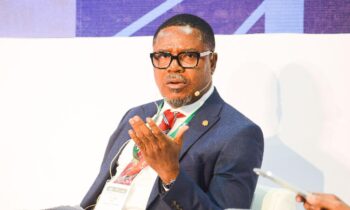
Oil major says risk profile of area is behind decision to end onshore activity
The delta shows few signs that the industry has operated there for decades yet it is rife with community problems.
by Neil Munshi in Lagos
Last month heralded the end of an era in Nigeria. Royal Dutch Shell, the company that in 1956 discovered oil at Oloibiri in the swamps of the Niger Delta and helped turn it into a posterchild for the resource curse, announced that it plans to end its onshore activity in the area.
Chief executive Ben van Beurden blamed the winding down on the risk profile of the delta, which has been wracked by communal tensions and criminality for generations. “We cannot solve community problems in the Niger Delta — that’s for the Nigerian government perhaps to solve,” he said. “We can do our best, but at some point in time, we also have to conclude that this is an exposure that doesn’t fit with our risk appetite any more.”
The delta is full of lush mangroves sprouting from water that shimmers with an oily, rainbow sheen. While crude worth billions has been extracted from its shores, it shows few signs that the industry has operated there for decades. Yet it is rife with “community problems”. They have flowed alongside its oil, which has wrought economic and environmental devastation, sowed poverty, destroyed farmland and fisheries, enriched corrupt politicians and strengthened organised crime syndicates.
For many who live there, the region is what it is today in large part because of Shell. The company “has huge historical and legacy issues with communities . . . that cannot be wished away,” says Ledum Mitee, former head of the Movement for the Survival of the Ogoni People. “They certainly have a responsibility to solve the problems in the Niger Delta caused by their activities.”
Mitee took over Mosop from Ken Saro-Wiwa, the celebrated activist and writer who led a peaceful protest seeking justice for the Ogoni over the environmental devastation of their homeland until Nigeria’s military government executed him and eight others in 1995.
“There is no doubt in our minds that Ken and my [other] colleagues were executed for the purposes of making it possible for Shell to operate without hindrance,” Mitee says. A Shell spokesperson says the company has “always denied, in the strongest possible terms” any responsibility for the state’s executions of the Ogoni Nine.
Shell argues that it contributes to Nigeria’s economy. It has 2,700 employees and more than 9,000 contractors, and paid $4.6bn into the country’s coffers in 2019 alone. The company says its withdrawal from onshore production would be done in collaboration with the government and local communities, and it will continue to meet its obligations for oil spills.
Energy is the world’s indispensable business and Energy Source is its newsletter. Every Tuesday and Thursday, direct to your inbox, Energy Source brings you essential news, forward-thinking analysis and insider intelligence. Sign up here.
“The challenges of the Niger Delta are complex and widespread, affecting communities where we may never have operated,” the spokesperson says. “Where we do operate, we bring jobs, support local supply chains and invest in the education and healthcare people rely on, as well as providing billions of dollars in income to the Nigerian government.”
The perception that Shell has been a negative actor has made it a convenient scapegoat for Nigeria’s corrupt political class, says Idayat Hassan, head of the Abuja-based Centre for Democracy and Development. “The problem is that of lack of governance, not just business,” she says.
Mike Karikpo, a delta-based lawyer with Friends of the Earth International, helped negotiate a long-delayed, billion-dollar clean-up of Ogoniland, which is largely funded by Shell and Nigeria’s state oil company but has been wracked by allegations of graft. “We hold the company accountable for nearly 70 years of reckless and self-regulated operation in our communities,” he says. “No matter how much Shell tries to evade responsibility for the destruction of our ecosystem, local livelihoods and the sociocultural fabric of our communities, it will fail.”
Karikpo points to a landmark Dutch court judgment which held Shell’s Nigerian subsidiary liable for oil spills in the delta and could open the door for more such cases. “Shell must pay for the clean-up and restoration of our environment,” he says. “It is debt it owes our generation and future generations of people in this region and it is debt we will work diligently and strongly to extract to the very last dime.”





